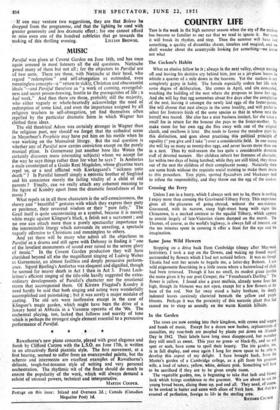MUSIC
Parsifal was given at Covent Garden on June 16th, and has once again aroused in most listeners all the old questions. Nietzsche posed many of them but not all ; for the objectors to Parsifal are
of two sorts. There are those, with Nietzsche at their head, who regard " redemption " and self-abnegation as outmoded, even meaningless concepts—a " return to sickly, Christian and obscurantist
ideals "—and Parsifal therefore as "a work of cunning, revengeful- ness and secret poison-brewing, hostile to the prerequisites of life ; a had work." And then there are those, probably still the majority,
who either vaguely or whole-heartedly acknowledge the need of redemption of some kind, and even the importance assigned by all religious teachers to self-abnegation, yet find themselves often repelled by the particular dramatic form in which Wagner has clothed these ideas.
The old theatrical Adam was certainly stronger in Wagner than the religious poet, nor should we forget that the cathedral scene
in Meyerbeer's Prophete may have put him on his mettle when he was working on the Monsalvat liturgy. But the real question is whether any of Parsifal now carries conviction except on the purely
musical plane. Is Gurnemanz just another bore like Wotan (he certainly discusses more interesting subjects) whom we accept for the way he says things rather than for what he says ? Is Amfortas a male counterpart of a Guido Reni Magdalen, whose glycerine tears repel us, or a soul afflicted with Kierkegaard's " sickness unto death " ? Is Parsifal himself simply a npnrotic brother of Siegfried and his conscience merely the failing vitality of a child of old parents ? 'Finally', can we really attach any coherent meaning to the figure of Kundry apart from the dramatic forcefulness of her music ?
What repels us in all these characters is the self-consciousness, the showy and " beautiful " gestures with which they express their piety or penitence, their reverend wisdom or their " pure folly." The Grail itself is quite unconvincing as a symbol, because it is merely white magic against Klingsor's black, a fetish not a sacrament ; and no one can attach more than a purely spectacular importance to the interminable liturgy which surrounds its unveiling, a spectacle vaguely offensive to Christians and meaningless to others.
And yet there will be many who admit all the objections to Parsifal as a drama and still agree with Debussy in finding it " one
of the loveliest monuments of sound ever raised to the serene glory of music." In the Covent Garden production they will have cherished beyond all else the magnificent singing of Ludwig Weber as Gurnemanz, an almost faultless and deeply persuasive perform- ance. Sigurd Bjorling's Amfortas was eloquent and dignified, though he seemed far nearer death in Act 1 than in Act 3. Franz Lech- leitner's efficient singing of the title-role hardly suggested the extra- ordinary developments of Parsifal's character nor the emotional storm that accompanied them. Of Kirsten Flagstad's Kundry it need hardly be said that both singing and acting were wonderfully accomplished and painstaking ; but it was surely a major mistake of casting. The old sets were inoffensive except in the case of Klingsor's magic garden, which might have ken the drive of a luxury hotel at Abbazia in a Viennese operetta of the '90s. The orchestral playing, too, lacked that fullness and suavity of tone
which is perhaps the strongest single element essential to a persuasive performance of Parsifal.
Rawsthorne's new piano concerto, played with great elegance and finish by Clifford Curzon with the L.S.O. on June 17th, is written in an attractively florid pianistic style. The first movement, at a first hearing, seemed to suffer from an overcrowded palette, but the scherzo and intermezzo are excellent examples of Rawsthorne's delicate, tough-but-tenuous style of writing and very personal orchestration. The rhythmic wit of the finale should do much to ensure the popularity of the work, which will always demand a soloist of unusual powers, technical and interpretative.
MARTIN COOPER.


















































 Previous page
Previous page